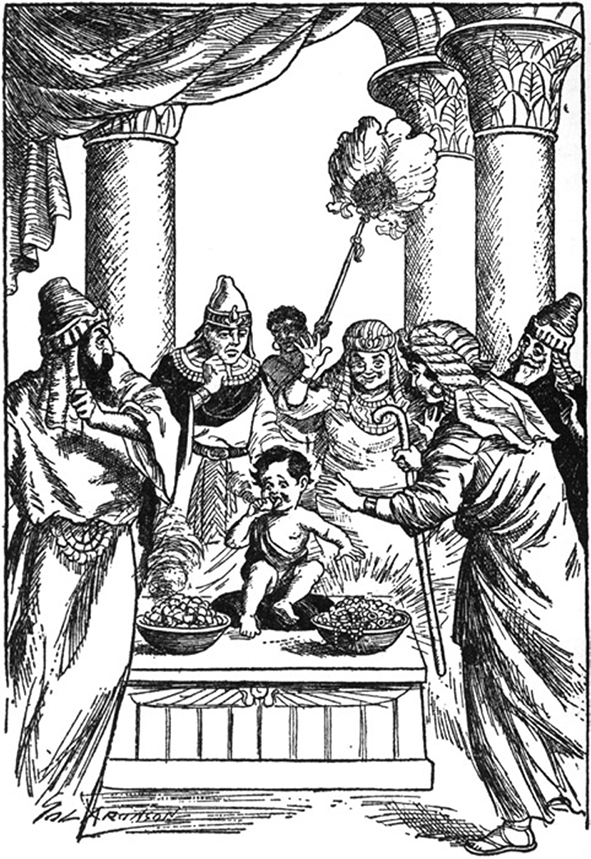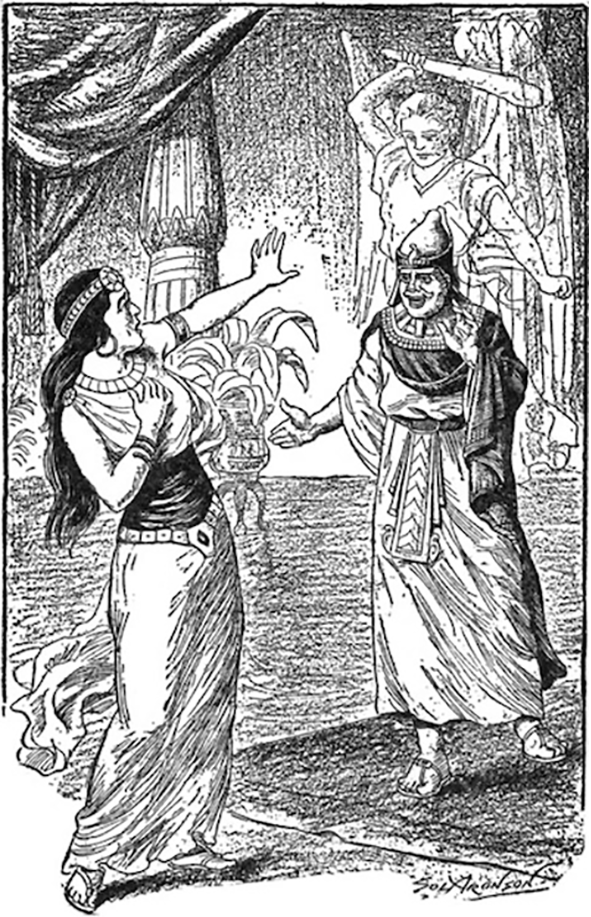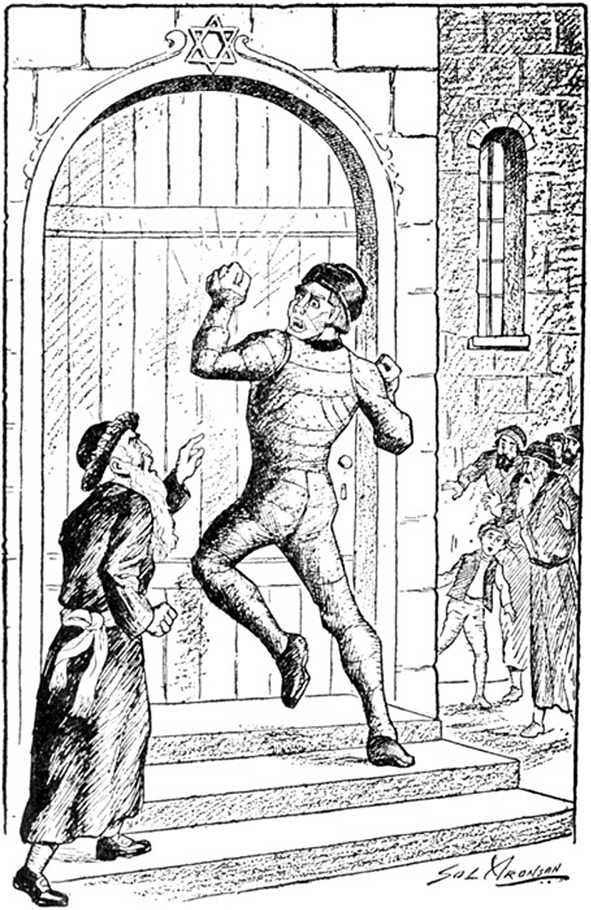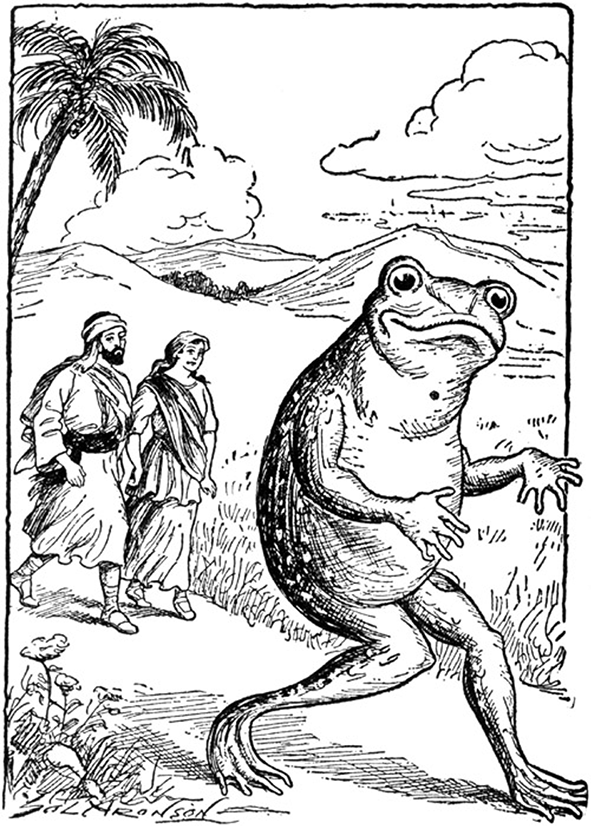Floating in a basket on the River Nile, Princess Bathia, the daughter of Pharaoh, King of Egypt, found a tiny little water-babe. Princess Bathia was a widow and had no children, and she was so delighted that she took the child home to the palace and brought it up as her own. She called the babe Moses.
He was a pretty little boy, full of fun and frolic as he grew up, and he became a favorite with everybody in the palace. Even the cruel King Pharaoh, who had ordered that all the Hebrew boy babes should be drowned, loved to play with him. His ministers of state and magicians, however, frowned when they saw Moses, as soon as he could toddle and talk, making a play-mate of the king. They warned Pharaoh that it was dangerous to give a strange child such privileges, but Princess Bathia only laughed at them. So did her mother, the queen, and King Pharaoh took no notice.
When Moses was three years old, Princess Bathia gave a birthday party in his honor. It was really a big banquet and was attended by the king and queen and all the courtiers. Moses was seated at the head of the table and his eyes opened very wide with wonderment at everything he saw. It seemed such a ridiculous lot of solemn fuss to him. He would rather have played on the floor, or climbed on to the table, but of course they would not allow him.
“What does all this mean?” he asked of the king who was seated next to him. “Tell me,” and he playfully pulled King Pharaoh’s beard.
The courtiers looked on horrified, and Bilam, the chief magician, cried out, “Beware, O king, this is not play.”
“Heed not these words, my father,” said the princess. “Bilam is ever warning thee. If thou wert to take notice of all that he says, thou wouldst not have a moment’s peace. Take our little babe on thy knee and play with him.”
To please the princess, King Pharaoh did so, and Moses amused himself by playing with the glittering jewels on his majesty’s robes. Then he looked up and stared hard at the king’s head.
“What is that?” he asked, pointing.
“That is the royal crown,” answered Pharaoh.
“No it is not; it is only a funny hat,” replied Moses.
“Beware,” chimed in Bilam, solemnly.
“Let me put the hat on,” said Moses, reaching up his little hands, and before they could stop him, he had taken the crown from the king’s head and had put it on his own.
Princess Bathia and the queen laughed merrily, but Bilam looked very grave.
“Your majesty,” he said, in a voice trembling with passion, “this is not the foolish play of a babe. This child, remember, is not as other children. Came he not from the river? There is meaning in his action. Already does he seek to rob thee of thy royal crown. ‘Tis a portent of evil.”
Pharaoh thoughtfully stroked his beard.
“What sayeth Reuel?” he asked, turning to his second chief magician.
“I say the child is but a babe and that this action means nothing,” answered Reuel.
The queen and the princess agreed with Reuel, who was their favorite, but Bilam would not allow the matter to pass lightly.
“I, Bilam, am chief of thy counselors,” he said, “and deeply learned in the mysteries of signs and portents. There is a meaning in all things. Remember, O King, this child is of the Hebrews, and escaped thy decree. This play of his hath a meaning. Should he be permitted to grow up, he will rebel against thee and seek to destroy thy rule. Let him be judged, O king.”
“Thy words are wise,” said Pharaoh, who was himself annoyed with Moses, and he ordered three judges to try the child for his offence.
Moses thought it was a new game and he clapped his hands gleefully when they took him to the court of justice and stood him in front of the judges. He heard Reuel plead on his behalf, but he did not understand it.
“I say he is but a babe and does things without meaning,” Reuel exclaimed. “Put him to the test, and see if he knows the difference between fire and gold. Place before him a dish of fire and a dish of jewels and gold. If he grasps the jewels, it will prove that he is no ordinary child; if he places his hand to the fire, then shall we be assured he is merely a foolish babe.”
“So be it,” said Bilam, “and if he grasps the jewels let his punishment be instant death.”
Pharaoh and the judges agreed, and two dishes, one containing burning coals and the other gold and precious stones were brought in and placed before Moses. Everybody looked on keenly as Moses stared at the dishes. Princess Bathia made signs to him, but Bilam ordered her to cease and it was Reuel who comforted her and dried her tears.
“Take my magic staff,” he said, handing to her a stick that seemed to be made of one large precious stone. “This was given to Adam when he left the Garden of Eden and has been handed down to me through Enoch and Noah, through Abraham and Jacob unto Joseph who left it in my keeping. Take the staff and Moses will obey whatsoever be thy wish.”
The princess took the staff and pressed it to her lips.
“I wish,” she said, “that my little water-babe shall seize the burning coals.”
Moses thrust his fingers into the fire and pulled out a glowing coal. With a cry, he put his fingers in his mouth to ease the pain and burned his tongue with the coal. Ever afterward he lisped.
The princess snatched Moses and pressed him tightly to her bosom.
“Give me the magic stick,” she said to Reuel, “so that I may guard and protect the child.”
“Canst thou read this word?” asked Reuel, pointing to a word engraved on the staff.
“No,” said the princess.
“Then it cannot be thine,” answered Reuel. “Whosoever reads this name can understand all things, even the thoughts of animals and birds. Fear not for Moses. In years to come this staff shall be his.”
And so it came to pass. Years afterward, when Moses was a man and fled from Egypt, he married a daughter of Reuel who became a Hebrew and took the name of Jethro. Reuel planted the staff in his garden and Moses saw it. He read the magic word, and touching the staff it came out of the ground into his hands. With this staff Moses performed the wonderful things in Egypt when he delivered the children of Israel from bondage, as is related in the Bible.










